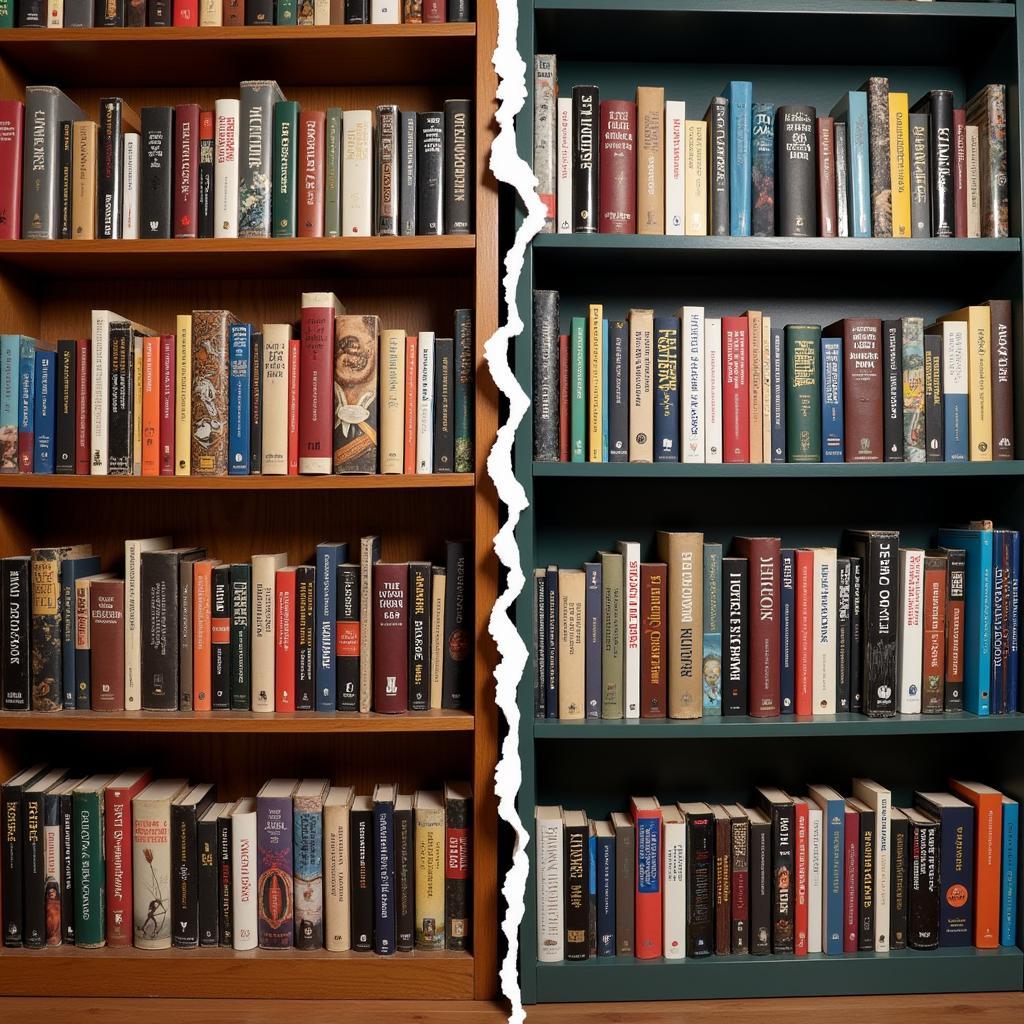Literary fiction and genre fiction often occupy distinct spaces in the literary landscape. Many readers find themselves drawn to one over the other, while some appreciate both for their unique qualities. What truly distinguishes literary fiction from genre fiction? This article delves into the nuances of each, exploring their defining characteristics, common misconceptions, and the blurred lines that often connect them.
Understanding Literary Fiction
Literary fiction often prioritizes character development, intricate prose, and exploration of complex themes over a fast-paced plot. These works aim to offer profound insights into the human condition, leaving the reader pondering long after the final page. Style and language play a crucial role, with authors crafting evocative imagery and employing symbolism to enrich the narrative.
- Focus on internal conflict: Literary fiction often delves into the internal struggles of characters, exploring their psychological and emotional landscapes.
- Emphasis on theme: These works often tackle universal themes such as love, loss, morality, and the search for meaning.
- Complex characters: Characters in literary fiction are often multifaceted and morally ambiguous, reflecting the complexities of real life.
- Experimentation with form and style: Authors may push the boundaries of traditional narrative structures and employ unconventional writing techniques.
 Phân biệt Văn học và Thể loại
Phân biệt Văn học và Thể loại
Exploring Genre Fiction
Genre fiction, including categories like science fiction, fantasy, romance, thriller, and mystery, typically follows established conventions and tropes within its respective genre. While these conventions can provide a framework for storytelling, they can also be subverted and reimagined by skilled authors. Genre fiction often emphasizes plot and entertainment value, offering readers an escape into different worlds and thrilling narratives.
- Clear genre conventions: Each genre has its own set of rules and expectations, which provide a familiar framework for both writers and readers.
- Focus on plot: Genre fiction often prioritizes a compelling storyline, with twists, turns, and a clear resolution.
- Entertainment value: These works aim to entertain and engage the reader, offering a sense of escapism and excitement.
- Defined settings and tropes: Genre fiction often utilizes established settings and character archetypes, allowing readers to quickly immerse themselves in the story.
The Blurred Lines: Literary vs Genre Fiction
The distinction between literary and genre fiction is not always clear-cut. Many works successfully blend elements of both, challenging traditional classifications. Some genre fiction explores profound themes and exhibits literary qualities, while some literary fiction incorporates genre elements to enhance the narrative.
- Literary elements in genre fiction: Many genre authors incorporate complex character development, thematic depth, and stylistic experimentation into their works.
- Genre elements in literary fiction: Literary fiction can utilize genre conventions such as mystery, suspense, or fantasy to explore literary themes.
- The evolving landscape of literature: The lines between literary and genre fiction are constantly shifting, with new hybrid forms emerging and challenging traditional definitions.
Literary vs. Genre Fiction: Which is “Better”?
The question of whether literary or genre fiction is “better” is subjective and depends on individual preferences. Both offer unique strengths and cater to different reading experiences. Literary fiction provides intellectual stimulation and emotional depth, while genre fiction offers escapism and entertainment.
- Appreciating both forms: Readers can appreciate and enjoy both literary and genre fiction for their distinct qualities.
- Personal preference: The “best” type of fiction is the one that resonates most with the individual reader.
Conclusion: Embracing the Diversity of Literature
Ultimately, the distinction between literary vs. genre fiction is less about hierarchy and more about understanding the nuances of each. Both forms offer valuable contributions to the literary world, catering to different tastes and reading experiences. Embracing the diversity of literature allows us to explore a wide range of stories and perspectives, enriching our understanding of ourselves and the world around us.
FAQ
- What are some examples of literary fiction? Examples include works by authors like Toni Morrison, Virginia Woolf, and James Joyce.
- What are some examples of genre fiction? Examples include works like “The Lord of the Rings” (fantasy), “The Martian” (science fiction), and “Gone Girl” (thriller).
- Can a book be both literary and genre fiction? Yes, many books successfully blend elements of both.
- Is literary fiction always serious? Not necessarily, though it often deals with complex and thought-provoking themes.
- Is genre fiction always light reading? Not necessarily, some genre fiction explores complex themes and social issues.
- What should I read if I’m new to literary fiction? Start with works that have won prestigious awards or are widely considered classics.
- What should I read if I’m new to genre fiction? Explore different genres and find what interests you most.
 Sự khác biệt giữa văn học và thể loại
Sự khác biệt giữa văn học và thể loại
Kêu gọi hành động: Khi cần hỗ trợ hãy liên hệ Số Điện Thoại: 02838172459, Email: [email protected] Hoặc đến địa chỉ: 596 Đ. Hậu Giang, P.12, Quận 6, Hồ Chí Minh 70000, Việt Nam. Chúng tôi có đội ngũ chăm sóc khách hàng 24/7.